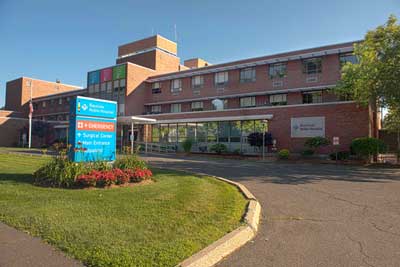WESTFIELD — When older patients arrive at Baystate Noble Hospital’s emergency room, doctors and nurses don’t just treat the injury or disease that brought them there. They’re also trained and equipped to address the age-specific needs of seniors.
Baystate Noble recently received Level 3 Geriatric Emergency Department Accreditation from the American College of Emergency Physicians. The honor means Baystate Noble’s emergency room has staff designated to serve older patients, procedures to screen patients for dementia, delirium and fall risk, as well as equipment on hand to address age-related physical needs, such as mobility aids.
“We couldn’t be more proud to receive this accreditation,” said Ronald Bryant, president of Baystate Noble Hospital. “It spotlights our commitment to providing inclusive, and patient-centered care for our senior patients.”
In 2019, about one-sixth of the 30,000 emergency room visits at Baystate Noble involved geriatric patients, defined as age 65 and older.
“Our numbers are definitely higher now,” said Dr. Sundeep “Sunny” M. Shukla, Baystate Noble’s chief of emergency medicine. “The geriatric population is an exponentially growing population of patients.” Nationwide, he said, “they account for about 20 percent of (emergency room) visits; by 2040, there’s talk of them being about 40 percent of the visits. We have to be able to provide specialized care for them.”
Baystate Noble is one of only two hospitals in the Pioneer Valley with this certification, Shukla said, and the only one in the Baystate Health network.
Shukla said improving geriatric care was one of his goals when he arrived at the Westfield hospital in March 2020. The final piece of the puzzle was a $5,000 grant the hospital received in January. About half that money paid for the application fee, while the other half purchased some of the supplies that set a geriatric-friendly facility apart from a standard emergency room.
This new equipment includes four-point canes, rollators — a walker that converts to a chair — and sound amplifiers for the hard of hearing. Shukla said the hospital has also purchased items specifically designed for patients with dementia and delirium, such as activity boards to keep them mentally active, and night lights for those who have developed a fear of the dark.
Trips to the hospital can cause anxiety and upset in older people, Shukla said, especially if they depend on being around familiar settings and familiar people. He said he would like to purchase iPads for use by geriatric patients, to play mind-sharpening games as well as teleconference with their families.
One simple requirement of the Geriatric Emergency Department Accreditation is that the hospital be able to provide food and drinks for patients 24 hours a day, not just at designated mealtimes. Many hospitals can’t meet this requirement, Shukla said.
He added that the certification isn’t just a recognition of the services and equipment the hospital can provide. It also denotes a level of staff training and focus.
“You have to have continuous quality improvements,” he said. “You have to have education for staff.”
Shukla said Baystate Noble trains its staff on the specific needs of geriatric patients, with a particular emphasis on “transitions of care”: ensuring that the emergency room visit dovetails with the patient’s other medical care. Part of being a certified geriatric facility is taking the time to help the patient navigate the healthcare system, including assigning a case manager to set up physical therapy or visiting nurse care, and communicating with the patient’s primary care physician.
“This designation acknowledges the personalized care our Emergency Department provides any senior adult who comes to us for emergency care,” commented Dr. T. Britton Percy, chief medical officer at Baystate Noble. “Patient experience is important to us at Baystate Noble Hospital, and we are intent on meeting any special needs our senior adult patients may have.”
Shukla said he’d like to see Baystate Noble upgrade its certification from Level 3 to Level 2 in the coming months. According to ACEP’s website, that involves demonstrating a greater staff commitment to geriatric care; tracking patient outcomes; and submitting to an audit to show that aging-friendly procedures are in place, among other requirements.








